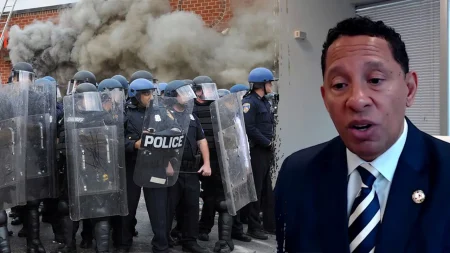Trump Disputes Intelligence Findings on Saudi Crown Prince’s Role in Khashoggi Murder
Presidential Challenge to Intelligence Community Creates Foreign Policy Rift
In an unprecedented break with his intelligence agencies, President Donald Trump has rejected a comprehensive U.S. intelligence assessment concluding that Saudi Crown Prince Mohammed bin Salman personally ordered the killing of journalist Jamal Khashoggi. This remarkable public dismissal of intelligence findings has sent shockwaves through diplomatic circles and raised questions about the administration’s commitment to press freedom and human rights accountability on the global stage.
The intelligence report, compiled through extensive signals intelligence, human sources, and forensic analysis, presented what officials described as “high confidence” conclusions linking the Crown Prince directly to the October 2018 murder inside the Saudi consulate in Istanbul. Khashoggi, a Washington Post columnist and Saudi dissident who had become increasingly critical of the kingdom’s leadership, disappeared after entering the diplomatic facility to obtain documents for his upcoming marriage. What followed was a carefully orchestrated assassination that intelligence agencies determined could not have occurred without the direct knowledge and authorization of the kingdom’s de facto ruler.
“They haven’t assessed anything yet. It’s too early,” President Trump told reporters at his Mar-a-Lago estate when questioned about the intelligence community’s findings. “The CIA has looked at it. They’ve studied it a lot. They have nothing definitive. And the fact is, maybe he did, maybe he didn’t.” This public skepticism of intelligence conclusions mirrors similar instances where the President has questioned agency findings, most notably regarding Russian election interference. Foreign policy experts view this as part of a concerning pattern where intelligence assessments appear subordinated to diplomatic and economic priorities, particularly given the administration’s emphasis on Saudi Arabia as a critical regional ally and major purchaser of American weapons systems.
Balancing National Interests and Human Rights: The Administration’s Calculation
The President’s stance highlights the complex calculations at play in U.S.-Saudi relations, where strategic interests in countering Iranian influence, securing energy markets, and maintaining defense contracts compete with human rights concerns. “The world is a very dangerous place,” Trump noted in a lengthy statement defending his position, emphasizing the kingdom’s role as a “great ally” in the region and the significant economic benefits of the relationship. The administration has repeatedly cited a proposed $110 billion arms deal with Saudi Arabia as a major factor in its approach, though analysts note that actual confirmed sales represent only a fraction of that figure.
This prioritization of economic and strategic interests over human rights accountability reflects a broader foreign policy doctrine that skeptics characterize as transactional diplomacy. “America First means protecting America’s vital national interests,” a senior administration official explained, speaking on condition of anonymity to discuss sensitive diplomatic matters. “While we don’t condone this terrible act, we must acknowledge that Saudi Arabia provides critical counterterrorism cooperation, stands as a bulwark against Iranian expansion, and remains an essential economic partner.” This perspective has found support among those who view Middle East policy through a primarily strategic lens, yet has alarmed traditional foreign policy experts who argue that abandoning human rights advocacy undermines America’s global leadership and moral authority.
The President’s rejection of intelligence findings has created unusual fissures within his own party, with several prominent Republican senators breaking ranks to criticize the administration’s position. Senator Lindsey Graham, typically a staunch ally of the President, called the Crown Prince “toxic” and stated he believed “he ordered the killing, he monitored the killing.” Similarly, former CIA Director Gina Haspel reportedly presented evidence to senators that left many convinced of the Crown Prince’s direct involvement, prompting Senate Foreign Relations Committee Chairman Bob Corker to declare, “If the Crown Prince went in front of a jury, he would be convicted in 30 minutes.” These divisions highlight the unusual nature of this foreign policy dispute, where concerns about executive credibility transcend typical partisan boundaries.
Implications for Press Freedom and International Accountability
The murder of Jamal Khashoggi represents one of the most brazen attacks on press freedom in recent memory, and the administration’s response has raised alarms about the message being sent to authoritarian regimes worldwide. Media advocacy organizations have expressed concern that dismissing intelligence findings about a premeditated killing of a journalist essentially provides a permission structure for other regimes to target critics with impunity. “When the United States fails to hold accountable those who murder journalists, it sends a terrifying message to tyrants around the world,” said Joel Simon, executive director of the Committee to Protect Journalists.
This incident occurs against a backdrop of escalating threats to press freedom globally, with a record number of journalists imprisoned worldwide and increasing sophistication in efforts to silence critical voices. Khashoggi’s murder, with its elements of extraterritorial reach and brazen disregard for international norms, represents a particularly alarming escalation. The journalist had sought refuge in the United States precisely because he feared retribution for his increasingly pointed criticisms of Saudi leadership, particularly the Crown Prince’s consolidation of power and crackdown on even moderate dissent within the kingdom.
Human rights experts note that the administration’s position undermines decades of bipartisan American leadership in promoting press freedom and protecting journalists worldwide. “This is not a partisan issue, or shouldn’t be,” explained Robert Mahoney, deputy executive director at the Committee to Protect Journalists. “Administrations of both parties have historically recognized that protecting journalists is not just a moral imperative but a strategic one—free flow of information supports democratic development and stability worldwide.” The President’s skepticism toward these traditional values signals what some foreign policy veterans describe as a fundamental shift in America’s self-conception on the world stage.
The Intelligence Community’s Response to Presidential Skepticism
For intelligence professionals, the public rejection of their assessment represents a profound challenge to institutional credibility. Current and former intelligence officials have privately expressed concern about the potential chilling effect on future analyses, particularly those that might conflict with the administration’s policy preferences. “Intelligence analysts are trained to follow the evidence wherever it leads, without regard to policy implications,” explained a former senior intelligence official familiar with the Saudi assessment. “When their conclusions are dismissed not based on competing evidence but seemingly for political convenience, it strikes at the heart of the intelligence mission.”
The Khashoggi case assessment underwent rigorous analytical scrutiny, incorporating signals intelligence from intercepted communications, human intelligence from sources within Saudi Arabia, and forensic analysis of the crime scene and subsequent cover-up attempts. Multiple intelligence agencies contributed to the final product, which represented a high-confidence consensus judgment linking the Crown Prince directly to the operation. This type of comprehensive assessment typically carries significant weight in informing policy decisions, making the President’s dismissal particularly notable to intelligence veterans.
The intelligence community has maintained a disciplined public silence regarding the President’s statements, adhering to professional norms about staying above political fray. However, congressional leaders with access to classified briefings have been more vocal, with several confirming that the evidence presented to them left little doubt about the Crown Prince’s involvement. “There’s not a smoking gun—there’s a smoking saw,” Senator Graham declared, referencing reports that Khashoggi’s body had been dismembered. These unusually blunt assessments from lawmakers who have viewed the intelligence underscore the strength of the evidence and the extraordinary nature of the President’s skepticism.
Long-term Consequences for U.S. Foreign Policy and International Relations
The administration’s handling of the Khashoggi murder may have lasting consequences for American influence and credibility on human rights issues globally. Diplomatic historians note that while the United States has certainly compromised on human rights concerns in the past when strategic interests demanded, publicly rejecting intelligence findings to avoid confronting a partner represents a more explicit subordination of values to interests than previous administrations have been willing to embrace.
This approach may yield short-term strategic benefits in maintaining cooperative relations with Saudi Arabia, but regional experts warn of potential long-term costs. “When we sacrifice credibility on human rights for immediate interests, we often find those interests themselves become harder to secure over time,” explained a former U.S. ambassador to the region who requested anonymity to speak candidly. “Regimes that face no accountability for the most extreme abuses typically become less stable partners, not more stable ones.” This perspective aligns with traditional foreign policy wisdom that American influence stems not just from military and economic power but from moral leadership and adherence to principled positions even when diplomatically inconvenient.
As the administration continues navigating this complex diplomatic terrain, the fundamental tension remains unresolved: can the United States maintain its historical role as a champion of press freedom and human rights while simultaneously prioritizing strategic partnerships regardless of how those partners behave? The President’s rejection of intelligence conclusions about Khashoggi’s murder suggests a clear preference for the latter approach, representing what many observers view as a profound recalibration of America’s global posture and values. Whether this shift proves temporary or permanent remains one of the most consequential questions facing American foreign policy in the coming years.










